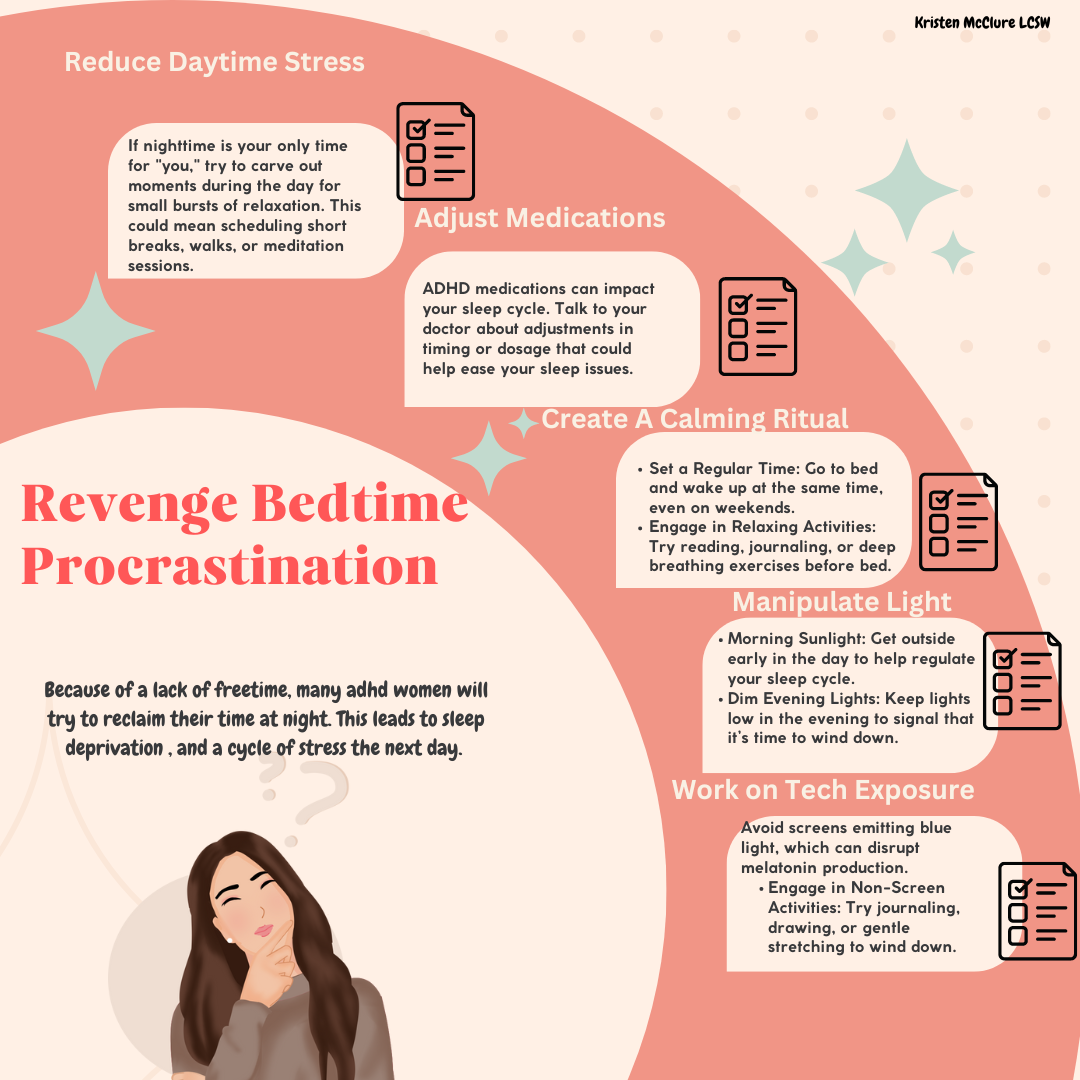Mindfulness for ADHD and Generalized Anxiety
Mindfulness for ADHD and Generalized Anxiety
Please click on orange links within the text for more information about that topic.

Did you know that women with ADHD are about five times more likely to experience generalized anxiety disorder (GAD) than women without ADHD? This connection between ADHD and generalized anxiety is significant, but there's hope. One effective approach to managing both ADHD and generalized anxiety together is through Mindfulness-Based Interventions (MBIs).
What Are Mindfulness-Based Interventions (MBIs)?
Mindfulness-based interventions (MBIs) are therapeutic practices that focus on cultivating present-moment awareness, often through meditation, breathing exercises, and mindful movement. The goal is to help you observe your thoughts, emotions, and sensations without judgment, allowing you to respond thoughtfully rather than react impulsively. For people with both ADHD and generalized anxiety, MBIs offer practical tools to manage attention, anxiety, and emotional overload.
How MBIs Support ADHD and Generalized Anxiety Together
Mindfulness helps tackle the common challenges that people with ADHD and generalized anxiety face. Both conditions can cause difficulty with focus, emotional regulation, and feeling overwhelmed, but MBIs provide a way to manage these symptoms at the same time.
- Improving Attention and Focus
If you have ADHD, you probably know how hard it can be to stay focused. With generalized anxiety, your focus may be hijacked by anxious thoughts or constant worries. Mindfulness for ADHD and generalized anxiety helps you train your attention by noticing when your mind wanders and gently bringing it back to the present. Whether it’s ADHD-related distraction or anxiety-driven overthinking, mindfulness can help you stay grounded in the moment.
- Reducing Mental Overload
ADHD often leads to overstimulation and racing thoughts, while generalized anxiety can make you feel trapped in a loop of worry. Mindfulness teaches you to observe these thoughts without getting stuck in them. For instance, you can learn to step back from impulsive or anxious thoughts and view them with curiosity rather than judgment. Over time, this practice helps reduce mental overload and makes it easier to regain control when things feel overwhelming.
- Balancing Emotional Reactivity
Both ADHD and generalized anxiety can make emotional regulation difficult. With ADHD, you might react impulsively, while generalized anxiety can cause overwhelming feelings of fear or anxiety. Mindfulness helps you pause and choose your response to emotions instead of reacting automatically. This is a powerful tool for managing both emotional impulsivity and anxiety, helping you feel more balanced emotionally.
Why MBIs Work for Both ADHD and Generalized Anxiety
Mindfulness for ADHD and generalized anxiety works well because it targets shared issues between the two conditions, such as:
- Attention control: ADHD and generalized anxiety both make it hard to stay present, either because of distractions or anxious thoughts. MBIs help you practice focusing your attention and gently returning to the present when your mind drifts.
- Emotional regulation: Emotional outbursts, impulsivity, and anxiety often go hand-in-hand with these conditions. Mindfulness-based interventions teach you how to pause, reflect, and respond calmly rather than react instantly.
- Reducing reactivity: Automatic reactions, whether jumping to conclusions or spiraling into anxiety, are common in both ADHD and generalized anxiety. Mindfulness helps you slow down and become more aware of these reactions, giving you more control over how you respond.
Mindfulness Techniques to Try
Here are a few mindfulness techniques that can help you manage ADHD and generalized anxiety at the same time:
Mindful breathing is a simple but effective way to calm your mind when your thoughts start to race due to ADHD or anxiety. Take a deep breath in, hold it for a moment, and exhale slowly. This practice helps reduce anxiety and brings your focus back to the present. It's a foundational technique in mindfulness for ADHD and generalized anxiety.
The body scan meditation encourages you to focus on different parts of your body, noticing any tension or discomfort without judgment. This can be especially helpful when you feel both restless (a common ADHD symptom) and tense from anxiety. It helps ground you in the present and reduce physical stress.
For people with ADHD, sitting still during meditation can be difficult. Mindful movement, like yoga or walking meditation, allows you to engage both your body and mind. This can reduce restlessness and help you feel more balanced and centered, making it a great tool for managing both ADHD and generalized anxiety symptoms.
Final Thoughts: Empowering Your Journey with MBIs
Mindfulness for ADHD and generalized anxiety isn’t about “fixing” anything or suppressing symptoms. Instead, it’s about developing self-awareness and self-compassion as you navigate the unique ways ADHD and generalized anxiety interact in your life. By practicing mindfulness, you’re learning to observe your thoughts and emotions with kindness and curiosity. This helps you respond rather than react, giving you more control over your mental and emotional well-being.
Mindfulness-Based Interventions (MBIs) offer a pathway to feeling more grounded, balanced, and connected to yourself, even when ADHD and generalized anxiety seem to work against you.





